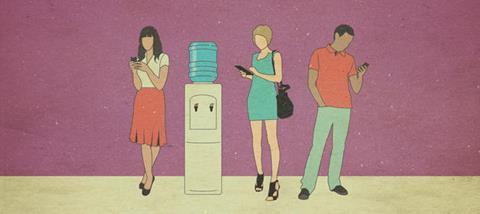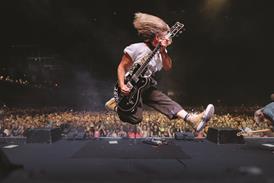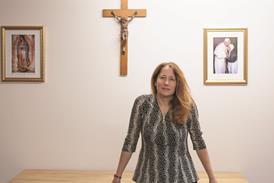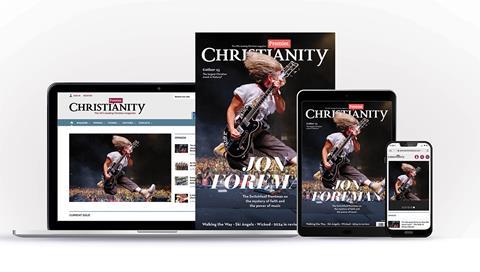
It’s incredible how quickly our technological developments get taken for granted. The obvious example is the mobile phone. The moment you get a new one, it’s out of date and in need of an upgrade – the camera isn’t up to scratch, the memory isn’t big enough and you’re unable to unlock it using the unique smell of your breath.
Progress inevitably leads to moaning: Netflix hasn’t got the new show we were after, iPlayer won’t stream quickly enough and Radiohead’s latest album isn’t on Spotify. Life is so hard.
We’re so busy taking these incredible advancements for granted, we fail to notice the impact they’re having on our lives. Netflix, iPlayer, Spotify, Amazon Prime, 4OD, Tidal, Hulu, Sky Go and Apple Music... the list goes on. These products have completely revolutionised the way we consume media. For example, Netflix’s usual practice is to dump an entire TV series, which would previously have been eked out week after week, onto its site all at once. We’re now able to binge-watch our favourite show the moment it comes out. Even if we try to consume media at a slower pace we’re inevitably at a different stage of Making a Murderer, Daredevil and House of Cards than the rest of our friendship group.
What we watch has changed as well. Statistics show that young people are watching far more content on YouTube than they are through traditional channels. The media has been democratised. Fifteen years ago we thought Pop Idol and Big Brother would fulfil Andy Warhol’s 15 minutes of fame prophecy, but in fact it’s YouTube which is bringing that into fruition. Young people don’t look up to Ant and Dec, but to Zoella and 100 other YouTube vloggers you’ve never heard of.
Spoiler alert
We could at this point spark alarm about who exactly these mystery faces with bedroom webcams are and the influence they’re having on the next generation. We could bemoan the loss of patience that the instant ability to watch an entire TV series has created. But these are merely modern symptoms of age-old diseases: humanity has always been struck by the disease of now.
The biggest casualty of all this has been the zeitgeist: the water cooler conversations; the shared experiences; the events so big that you have to share them with everyone in that moment. But no more. Gone are the days when the big drama would be dissected and picked apart in the office the next morning: instead we all live in fear of spoiling or being spoiled by someone further ahead.
This isn’t just a product of Netflix. As the mainstream TV channels have put more and more of their content online (spearheaded by the BBC’s iPlayer), so-called appointment-toview television is on the way out. It now only exists in the realms of TV talent shows (which are dwindling in popularity), sporting events (which – as any true fan will tell you – can’t be properly appreciated on catch-up) and, obviously, baking competitions.
Christmas TV used to be a big deal. But last Christmas saw the lowest audiences for the most popular shows since the rating system began. The 1989 TV premiere of Crocodile Dundee still holds the record for the largest ever Christmas Day audience. Even the music we listen to is no longer a communal event – the album release day has become a thing of the past, as your first chance to listen will depend on the deal struck by your preferred streaming service.
The battle against community
There’s an idea out there that the internet has been an incredible force for social good – uniting communities across the world over shared interests, memes and trending topics. And while that’s true to a point, it’s created something similar to the echo chamber phenomenon (see ‘Life inside the bubble’, January). We hunker down into our culturally relevant silos, barely popping our heads over the parapets to discuss The Great British Bake Off, England’s latest exit from a major football tournament and Honey G.
The internet has made us alone, together
Virtual communities might spring up around particular shows or vlogs, but the shared experience where people come into work, school or church discussing a particular song, TV show or performance is quickly becoming a thing of the past: another point chalked up to individualism in its 21st century battle against community.
The way we consume news has also become fragmented. No longer are headlines and agendas driven by newspapers; by the time they hit the shops, they’re often behind the news cycle. Twenty years ago, today’s newspapers were tomorrow’s fish and chip paper, but it might be more accurate to say that in 2017, the morning’s newspapers are lunchtime’s fish and chip paper.
Society has always been fragmented: along class lines; political views, religious dispositions and geographical quirks, but it seems that for the first time in human history, we’re beginning to lose those moments that unite these disparate groups. You could argue that in the last year, the moments of solidary and unity were created by celebrity deaths and global tragedies, which is a pretty macabre way to foster a feeling of community.
Even within our small church communities, our spiritual lives become disjointed. Congregations seem as likely to compare notes on the latest The Liturgists or Unbelievable? podcasts than on whatever the church leader has said that week. The techsavvy among us can create our own spiritual Netflix – full of weekly input from our favourite bloggers, preachers and YouTubers. We’re all on our own ‘individual’ journeys, rather than walking together as a community. All of which seems a bit more serious than people binge-watching the latest series of Orange is the New Black. It’s great that the internet allows people to grow in their spiritual lives throughout the week, rather than waiting until the weekend for a theological top-up, but I wonder if we’re missing something.
There’s real danger in allowing the internet to shift us all into our own silos. Part of the beauty of the Judeo-Christian tradition is that it’s a communal expression of faith. The biblical story is our story. The stories passed down throughout countless generations have been shared as fresh for each generation: God freed us from Egypt, we went into exile, Jesus died for us. We lose out on so much beauty if we take these things and individualise them, cutting ourselves off from the bigger picture. I think there’s a glorious discipline in submitting oneself to those leading and congregating our churches.
Often the most insidious, damaging change is the one we don’t notice
What the experts say
“The internet was supposed to homogenise everyone by connecting us all. Instead what it’s allowed is silos of interest.” Seth Godin
“The internet, by its very nature, not only facilitates the expression of individualism, it has increasingly been shaped by individuals for this purpose.” Christina Kalinowski
“The Church’s natural style fits the pattern of the social media world – that of participation and creativity rather than a broadcast hierarchical structure. So look to see what digital technologies allow us to do differently, and capitalise upon that.” Bex Lewis
Recovering our third spaces
The zeitgeist hasn’t died due to old age; we can’t blame its demise on Netflix and Spotify. It’s died because we’ve all created our own news / entertainment / spiritual playlists – now we don’t have to be held to the whim of the taste-makers, we’ve no interest in what they have to say.
You might be reading this and thinking: “Sorry, I’ve no idea what you’re talking about. I still watch the six o’clock news and Eastenders, read The Guardian and love whatever our vicar has to say on a Sunday.” That’s brilliant. Genuinely. But for many people, especially young people, this isn’t the world they live in.
In a world which already feels isolating and fragmented, where many are alienated and young people feel they have no stake in society, those cultural touchstones were really important.
Those moments when everyone came together to celebrate (be it a royal wedding or finding out who the murderer was on Coronation Street) had real value. But as those things subside (most of the royal family have been married off while most of the regulars at the Rovers Return have been killed off), those moments when society come together have become few and far between, which only further entrenches us in our silos, and enhances the feelings of isolation.
You may be familiar with the idea of ‘third spaces’; somewhere that is neither home nor work, but a place where communities gather – be it parks, pubs or social clubs. Places people would come together to discuss the big issues of the day – politics, football and whether Adnan Syed really did commit that murder in the Serial podcast. But these places are dying along with the zeitgeist – people no longer find community in this way. The internet has made us alone, together.
Churches used to be third spaces. They used to be at the centre of our society, providing shared experiences and moments; a meeting place for communities – an Acts 17, Mars Hill gathering. What if we tried to reclaim this? What if we opened up our churches for shared moments for all of society – for bakery programmes, football matches and season finales? What if our churches became meeting places and argument facilitators? What if our churches not only sought to bring back some sense of the zeitgeist, but also to break down our echo chambers – becoming places where people with different views and beliefs came together not just to talk to each other, but to genuinely listen? What if our churches were neither Jew nor Gentile, slave nor free, Brexiteer nor remainer? What if we encouraged awkward conversation rather than shied away from it?
Changing media habits
The internet was used daily or almost daily by 80 per cent of adults in Great Britain in 2016, compared with 35 per cent in 2006.
Young people aged between 16 and 24 spend more than 27 hours a week on the internet.
In 2012, Netflix had 1.2 million UK subscribers. Today they have over 5 million.
iPlayer has received over 15 billion requests for TV and radio programmes since it launched on Christmas Day 2007.
16 to 24s watch over twice as much TV on other devices as the average viewer.
In 2010 the Mental Health Foundation found loneliness to be a greater concern among young people than the elderly. The 18 to 34-yearolds surveyed were more likely to feel lonely often, to worry about feeling alone and to feel depressed because of loneliness than the over-55s.
Embracing real community
In a society which is becoming more isolated, and where people’s lives are becoming more fragmented, the Church and our ministries are one of the few places where people can experience true community. We have a wider, bigger, deeper story to invite people in to. We have shared narratives and moments that we can experience together. We know that people are desperate to be part of something bigger, that’s why niche communities spring up around obscure cultural fascinations (the Reddit thread about Serial and all kinds of fan fiction are good examples of this).
Our churches are in a beautifully countercultural position to fill the gap in people’s offline experiences. We need to embrace the community the Church offers – not to dismiss the endless wisdom and hope that we find in our Christian communities, but to commit fully, to be present and to journey with the sacred communities we are part of. Because if not, our Sunday services will become places full of people travelling alone, together.
I don’t think we need to be scared of the internet. I believe it’s been an incredible force for change and good across the world. But often the most insidious, damaging change is the one we don’t notice. The zeitgeist has died and no one cared; we were all too busy binge-watching The Crown. But what if this demise was an opportunity? What if the Church retook its place, its space in the centre of community? What if the death of the zeitgeist prepared the way for the resurrection of the Church?
Jamie Cutteridge is editor of Premier Youth and Children’s Work. youthandchildrens.work



























